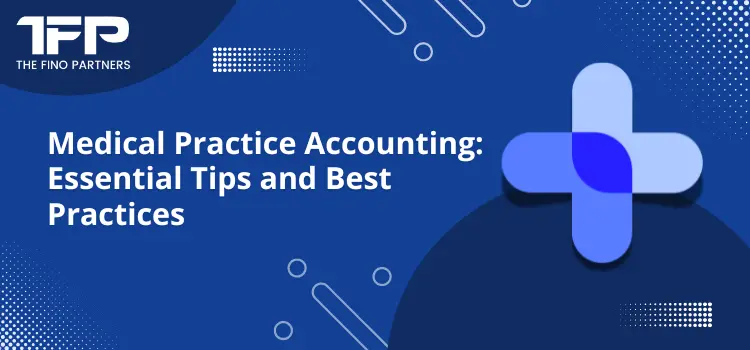A flourishing medical practice has been constructed on effective bookkeeping. It assures that the practice stays financially sound, operates effectively, and complies with legal and regulatory requirements. Accounting may seem intricate and daunting to physicians and other healthcare providers who are more concerned with delivering treatment for clients. However, putting in place an effective accounting system will help with boosting profitability, simplifying procedures, and lowering errors. In order to help U.S.-based medical procedures handle financial issues while improving their business operations, this article will go over essential techniques and standards to handle accounting in a medical practice.
The In-Depth Journey: Deep Diving Into Medical Practice Accounting
- Because health care facilities are separate businesses, they need specialised accounting.
- They deal with Medicare reimbursements, insurance billing, and laws and regulations, unlike regular businesses.
- Therefore, for successful financial administration, a basic understanding of medical accountancy is required.
- Client Relationship Management (CRM): In medical accounting, revenue cycle leadership is essential. It covers every way, including billing and payments in addition to patient registration. Putting a clear RCM system established for the practice will improve cash flow, reduce the amount of outstanding claims, and enhance profitability.
- Monitoring Claims for Insurance and Patient Payments: Having an efficient system for patient payments and insurance claims is important.
- Being vigilant about this process is crucial for maintaining financial stability because billing errors and delays can have an adverse effect on cash flow.
The Tech Revolution: Utilizing Advanced Software For Medical Accounting
Managing a medical practice's finance can be significantly enhanced by investing in suitable accounting software. Processes related to payment, payroll, accounts payable, and accounts receivable can all be automated with specific medical accounting software. Key Aspects to Consider:
- Automated Billing: Allows the generation of precise invoices and tracking of claims to ensure prompt payments.
- Practice Management Software Integration: With this integration, you are able to maintain track of patient appointments, medical expenses, and insurance details.
- Compliance Tracking: A method that analyses adherence to healthcare laws and helps physicians stay out of problems with the law.
- Custom Reports: Financial reports that throw light on expenditure, profitability, and other significant indicators ought to be generated by the software.
The Different Corridors: Seperate Accounts For Personal And Business Finances
Failing to keep personal and business's finances separate is one of the most financial traps for small- to medium-sized medical businesses. For proper accounting and tax reporting, these accounts must be maintained separate.
Means to Divide Finances:
- Construct a business savings account that is devoted to your practice.
- Pay for practice-related expenses employing a business credit card.
- Create a specific payroll account for self-compensation and employees.
- Maintaining business and personal expenses apart allows it to be simpler to keep track of spending and maintain precise records in the event of an audit.
The Law On-Board: Keeping Up With Relevant Regulations
- Many standards of compliance pertain to medical professions, especially in the United States where there are stringent healthcare laws.
- Violations of the law may result in substantial fines and legal proceedings.
- Make sure your accounting procedures meet with the rules of the Health Insurance Portability and Accountability Act (HIPAA), particularly when it comes to patient records and billing information.
- Tax laws must also be then followed by medical practices. It's critical to periodically verify all of your tax debts, including business income tax, sales tax (if relevant), and payroll taxes.
- Hiring an expert with experience in healthcare regulations for your taxes can help you save time and prevent costly mistakes.
Preparing For The Finest Future: Budgeting and Forecasting
An established budgeting and forecasting methodology is essential for medical practices to efficiently prepare for future expansion and handle cash flow.
- Make a Budget for the Year: A budget will help you to prepare for things like payroll, healthcare equipment, and other overhead. When calculating income, take sure to account for the potential of delays in insurance reimbursements.
- Money Forecast: Based on past data, forecasting may help with comprehending future trends in revenue. It allows practitioners to make better decisions about staffing up, investing in equipment, and expanding their service offerings.
The Best Alternative: Outsourcing Accounting Services
It can be quite challenging to handle patient care and bookkeeping while running a healthcare business. Many practices prefer to work with specialised businesses to handle their accounting needs.
Benefits of Outsourcing:
- Healthcare Accounting Expertise: Medical practice-focused professional accounting businesses possess comprehensive knowledge of healthcare laws and industry standards.
- Economic Time: You are able to focus on caring for patients rather than handling paperwork by using outsourcing.
- Economically Sound: Since you just pay for services when they need to be provided, it is often cheaper than hiring permanent staff for accounting.
Keeping Up With The Cash-Flow
A medical practice is similar to any other business in that handling financial affairs is important. Make sure the revenue is regularly coming in and the expenditure remains under control.
Optimal Approaches for Tracking Cash Flow:
- Track unpaid bills and enquire about remaining balances from clients or insurance companies.
- Keep an archive of your cash flow and evaluate it once a month.
- Assess the business's liquidity on a regular basis to be sure there's enough cash to pay for monthly overhead.
Conclusion
The proper handling of accounting can make the difference between struggling financially and success in running a medical business. Physicians can maintain oversight of their financial affairs by following to the mentioned above best practices, which involve putting in place specialised accounting software, ensuring that compliance is met, maintaining an eye on cash flow, and maintaining both personal and business finances apart. Expert accounting work outsourcing may also speed up the process while freeing up clinicians to focus on giving their patients excellent treatment. Fino Partners can be an excellent choice for outsourcing accounting services for your business to stay on the path to success.




























